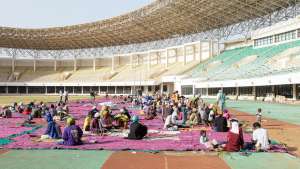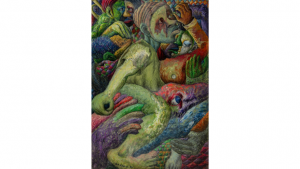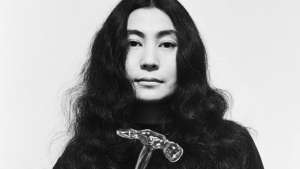From the Series
“The basic idea behind Invisible Borders is to bring Africa artists together,” says Emeke Okereke, a Nigerian photographer and founding member of the collective. “We began the process of looking at trans-African exchange. There was very little exchange between artists and cultural operators within the continent, and Invisible Borders was basically founded to ask the question of how do we engage other peoples on the continent.”
Invisible Borders is an art-led initiative, founded in Nigeria in 2009 by a group of passionate photographers who wanted to tell Africa’s stories through images and artistic interventions that were created by Africans themselves. It also grew to be a platform that could showcase emerging talent on the continent, as a stepping-stone for young artists at the onset of their careers. The project began with plans for a road trip with a group of mostly photographers and a writer.
“What happens if we were to take a trip beyond Nigerian borders and visit other African countries by road? We know there is no river or sea dividing the continent,” says Okereke. “We’ve always this sense that there is a lot we don’t know [about Africa] and it is so rich. Things that we know about our own continent comes from the mainstream media sometimes.”
The activities of the collective aim to break down divisions at a local, national and international level, creating points of connection.
“The ultimate goal is to be faithful to the encounters we have, sometimes spontaneous, sometimes more predetermined. We are not journalists, we are not anthropologists, we are artists - so we believe also in spontaneity, “ says co-founder and writer Emmanuel Iduma.
Since the first edition of the trip in 2009, during which nine photographers and a writer travelled from Lagos, Nigeria to Bamako, Mali with stops in Benin, Ghana, Togo and Burkina Faso, the group have travelled in 2010 from Lagos to Dakar and in 2011 from Lagos to Addis Ababa.
During their most recent trip, the Invisible Borders members decided to stay closer to home, and investigate Nigerian identity in a project they named “Borders Within”.
“People are more loyal to family and associations than anything called ‘Nigeria’,” explains Okereke. “We wanted to begin a conversation about ‘what is Nigeria?’”
Nigeria is a remarkably diverse country with many religions, languages, ethnicities and ideas about modernity and tradition. The Borders Within trip, which took place over the course of 46 days in May and June 2016, aimed to illuminate some of the ambiguities of contemporary Nigerian life.
The central questions asked by the group of travelling artists (of themselves and those they met) were: Who am I in relation to the artificial map? How am I a product of what I have been inevitably named? How do I interact across the several visible and invisible borders I confront as a Nigerian?









